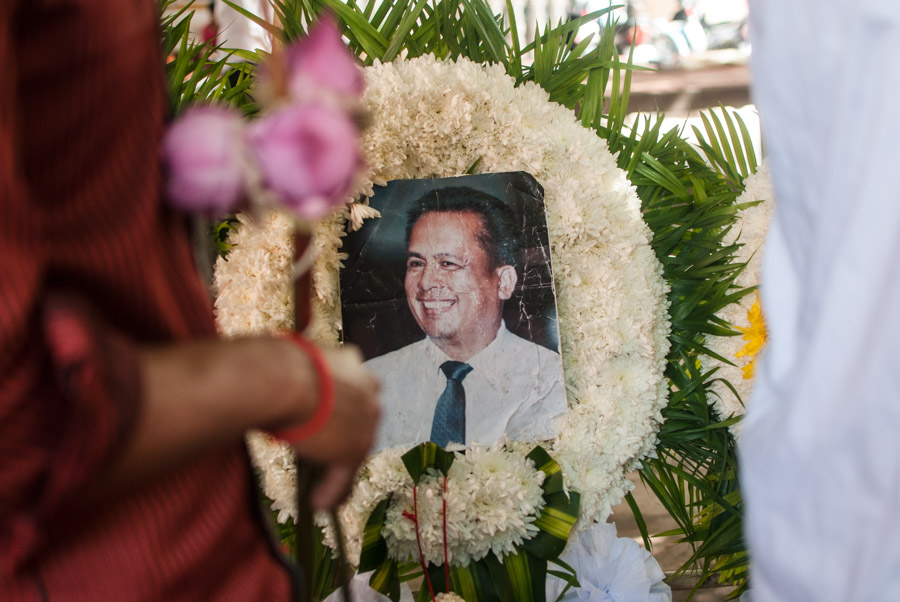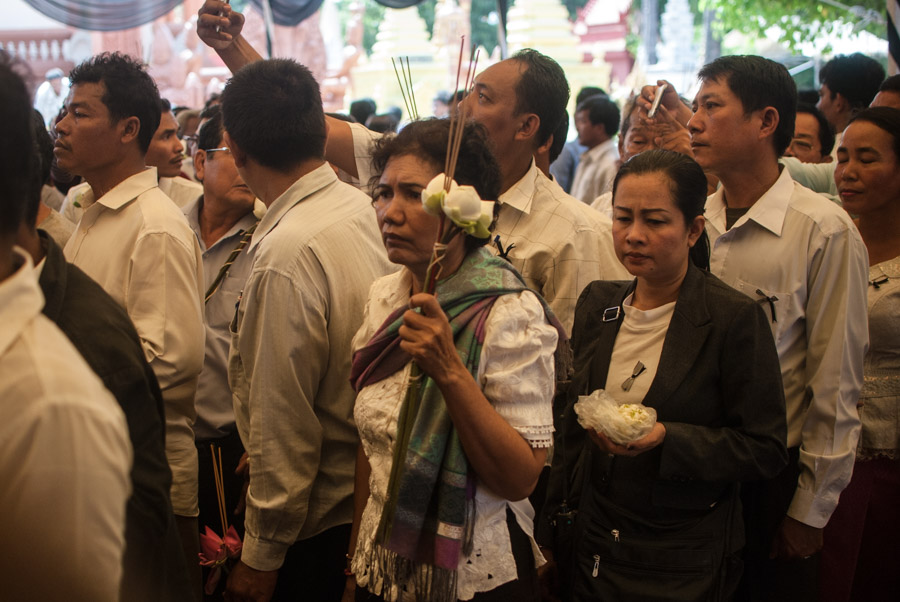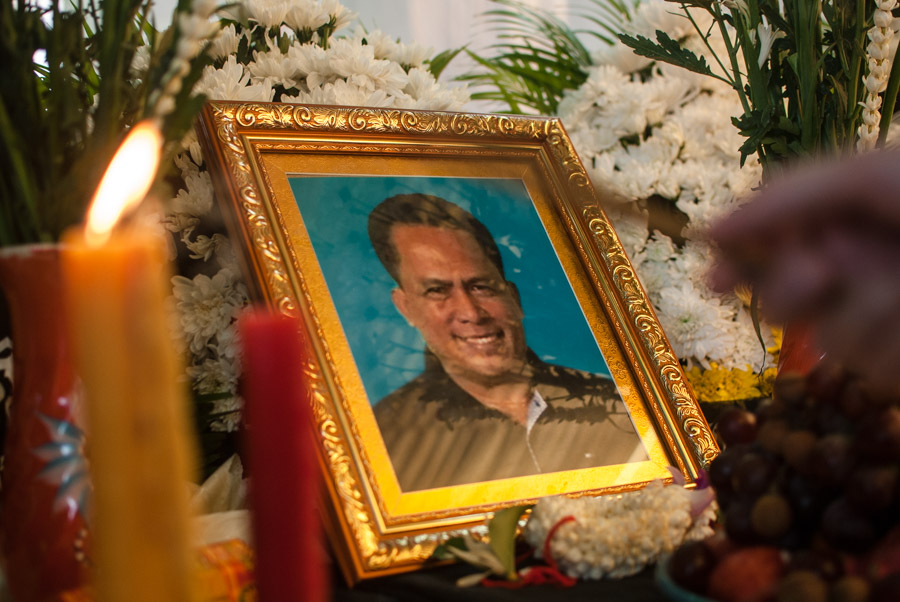Political tensions are intensifying in Cambodia following the brazen daytime killing of a high-profile activist in the capital Phnom Penh. Kem Ley, a prominent political commentator and grass roots organizer who had just established a new political party, was shot dead shortly after 8.30 a.m. on July 10 while drinking coffee at a service station on a busy downtown intersection. The murder sent shock waves through the nation, raising political temperatures as the country moves toward local council elections next June and crucial national polls in mid-2018.
Police arrested a man who confessed to shooting the advocate over a $3,000 debt, but many Cambodians have been quick to claim that the murder was politically motivated — just the latest in a string of similar execution-style killings stretching back to the early 1990s. In a message posted on his Facebook page just hours after the killing, opposition leader Sam Rainsy denounced Kem Ley’s killing as an “assassination” and an “act of state terrorism.” Loun Sovath, a Buddhist monk and political activist, said that the act had all the hallmarks of “the traditional way of politics” in Cambodia. “They kill whoever is brave, whoever is smart, whoever is a leader,” he said.
In recent years Kem Ley, who headed the Khmer For Khmer rural advocacy network, had become a frequent fixture on Khmer-language radio and traveled widely through the countryside. Ou Virak, the president of the Future Forum policy institute, said that the slain advocate had won a large following by tailoring his language to appeal to rural people. “Kem Ley was a gifted communicator. He was able to simplify big ideas and policies into languages the people could understand,” Ou Virak told the Nikkei Asian Review.
In August 2015, Khmer For Khmer registered a new Grassroots Democracy Party, which was gearing up to run candidates in next year’s council elections. In the days before his death, Kem Ley highlighted questions raised in a new report from the U.K.-based corruption watchdog Global Witness, alleging that Hun Sen and his family had accumulated vast amounts wealth over the past three decades.
As news of the murder broke on social media, crowds descended on the petrol station where Kem Ley was shot and prevented his body from being taken away by an ambulance. It was eventually carried to Wat Chas pagoda, where it is being held until July 20, before the planned cremation.
On July 12, a large crowd had gathered at the pagoda to pay their last respects. Mourners lit incense and laid flowers beneath photos of the late activist. Some gently touched the dead man’s cheek as they passed his open casket, which was heaped with sweet-smelling wreaths of jasmine.
“We all feel sorry,” said Son Soubert, a former member of the Constitutional Council and a prominent member of the opposition, who attended the wake earlier in the week. “Mr. Kem Ley was very popular. The way he made his political arguments, it touched the poor. They accepted what he said.”
The assassination underscores the growing political dissent in Cambodia. Over the past 12 months, the government led by Prime Minister Hun Sen and the Cambodian People’s Party has arrested more than 20 people, including opposition parliamentarians, human rights activists, and a member of the National Election Committee, Cambodia’s official election body.
Opposition leader Sam Rainsy, president of the ascendant Cambodia National Rescue Party, is in self-exile overseas to avoid arrest on an old defamation charge if he returns to the country. Meanwhile, his deputy Kem Sokha has been holed up inside party headquarters for the past six weeks, facing criminal charges of his own relating to an alleged affair with a young hairdresser.
Back to bad old days
Kem Ley’s daylight assassination is an unsettling throwback to the early 1990s and early 2000s, when public murders of prominent journalists, union leaders and opposition politicians were disturbingly commonplace. Among the most well-known victims were royalist politician Om Radsady, shot and killed while he has having lunch in Phnom Penh in early 2003; and labor leader Chea Vichea, gunned down at a newspaper stand the following year. The New York-based advocacy organization Human Rights Watch claims that more than 300 people have been killed in politically motivated attacks in Cambodia since the early 1990s. The group says that very few have ever been brought to justice for the killings.
Prime Minister Hun Sen has promised a “vigorous” investigation into the killing and urged his countrymen not to jump to conclusions. But in a speech on July 12, he suggested that the murder may have been organized by unspecified enemies in a bid to discredit his government. “This is a huge loss and impacts the government’s image. Who gains to benefit from such a case which happened at the same time the government is talking about peace and safety for the people?” he said. Later, one CPP-aligned news website openly pinned the crime on the opposition CNRP in general, and Kem Sokha in particular, claiming that the leader saw Kem Ley as a “traitor.”
In a joint statement on July 11, 70 Cambodian civil society groups said that the only way to allay public concern would be to conduct a transparent investigation of the murder. “It is imperative that the investigation surrounding Kem Ley’s murder be conducted with the utmost transparency if it is to be credible and diffuse misunderstandings,” the statement said. The main suspect in the shooting, identified as 43-year-old Oeuth Ang, a former soldier and forestry official, appeared in court for questioning on July 12.
While political violence has gradually receded in Cambodian political life as Hun Sen has consolidated his hold on power, his party, in power since 1979, faces a steep challenge in extending its rule beyond the 2018 national election. At the last election in mid-2013, the CNRP cut deeply into the ruling party’s parliamentary majority, drawing on surging public discontent about corruption, paralyzed public institutions, and the lack of economic opportunities. For a more educated and more connected electorate, the CPP’s old claim to legitimacy — that it brought peace and stability to Cambodia after decades of chaos — has started to lose its effect.
In this context, Kem Ley had assumed an increasingly prominent status as a campaigner and commentator who fearlessly anatomized his country’s ills. It was after the 2013 election that he became disillusioned with the CNRP and founded the Khmer For Khmer advocacy network through which he gained a wide following.
For now, public anger seems to be contained. But Son Soubert said that while violent political tactics may have achieved their aim in the past in Cambodia, in the long term they are less likely to frighten new generations that are more connected via the internet and more informed about their country’s affairs than ever before. “I don’t think they can intimidate them anymore, especially the young people. They are more educated now, even in the countryside,” he said. “They say, ‘you can’t lie to us. We know everything now.'”
Published by the Nikkei Asian Review, July 13, 2016.






